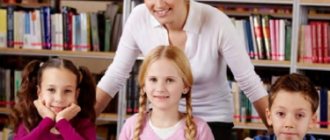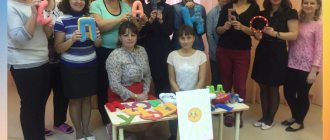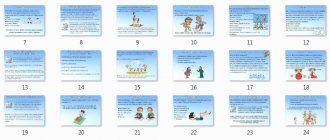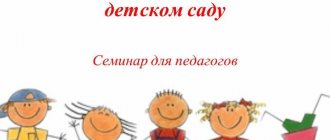Pedagogical activities aimed at the comprehensive development of the child’s personality will be more effective if they are built in accordance with the nature, culture of the child and the teacher.
In the course of pedagogical activity, a special communication arises between the teacher and the child, in which the participants find their own view of the world. The task of pedagogical activity in the context of a dialogue between the cultures of the teacher and the child is twofold: on the one hand, to strengthen and develop the child’s ways of thinking, position, and picture of the world; on the other hand, organize interaction with another culture (an adult).
The leading role of the teacher (adult), organizing the process of raising and educating a child, is quite fully defined in the studies of A.V. Zaporozhets, P.Ya. Galperina, L.A. Wenger et al. S.L. Rubinstein repeatedly emphasized that the pedagogical process shapes the child’s personality to the extent that the teacher guides his activity and does not replace it. Similar conclusions are contained in the works of V.S. Merlina, J. Strelyau, A.B. Nikolaeva, A.V. Petrovsky, R. Burns and others.
The most general task of pedagogical activity in the educational process is to create conditions for the harmonious development of the individual, to prepare the younger generation for work and other forms of participation in the life of society. It is solved by organizing a personally developing environment, managing various activities of students and building correct interaction with the child.
In pedagogical science, there are two types of interaction between teacher and child: subject-object and subject-subject.
1. Subject-object relations. In pedagogical activity, the role of the subject is the teacher, and the role of the object is the student (child).
The teacher as a subject of pedagogical activity is characterized by goal setting, activity, pedagogical self-awareness, adequacy of self-esteem and level of aspirations, etc. In this situation, the child acts as a performer of the requirements and tasks set by the teacher. With reasonable subject-object interaction, the positive qualities of children are formed and consolidated: diligence, discipline, responsibility; The child accumulates experience in acquiring knowledge, masters the system, the orderliness of actions. However, as long as the child is the object of the pedagogical process, i.e., the motivation for activity constantly comes from the teacher, the child’s cognitive development will not be effective. A situation where there is no need to show initiative and limited independence often creates negative aspects of the personality. The teacher “sees” his students in a very one-sided way, mainly from the point of view of compliance/non-compliance with the norms of behavior and the rules of the organized activity.
2. Subject-subject relationships contribute to the development in children of the ability to cooperate, initiative, creativity, and the ability to constructively resolve conflicts.
The most complex work of thought processes and imagination is activated, knowledge is activated, the necessary methods are selected, and various skills are tested. All activities acquire personal significance for the child, valuable manifestations of activity and independence are formed, which, with a sustainable strengthening of the subject position, can become his personal qualities. During subject-subject interaction, the teacher understands his students more personally; such interaction is called personality-oriented. A personality-oriented teacher maximizes the development of the child’s ability to realize his “I” in connections with other people and the world in its diversity, to comprehend his actions, to foresee their consequences, both for others and for himself. Pedagogical activity in this kind of interaction is dialogical in nature. M. Bakhtin believes that a child only in dialogue, entering into interaction with another subject, gets to know himself, through comparison with another, through a comparison of his choice and his own choice.
The nature of the interaction between the teacher and the child determines the style of pedagogical activity. In domestic science, the works of I. V. Strakhov, N. D. Levitov, E. A. Klimov, V. E. Chudnovsky, V. I. Morosanov and others are devoted to the study of this problem.
A.K. Markov differentiates democratic, authoritarian and liberal styles of pedagogical activity and describes them as follows.
With a democratic style of pedagogical activity, the child is considered as an equal partner in communication and cognitive activity. The teacher involves children in decision-making, takes into account their opinions, encourages independent judgment, and takes into account not only academic performance, but also personal qualities. Methods of influence are encouragement to action, advice, request. Teachers with a democratic style of interaction are characterized by greater professional stability and satisfaction with their profession.
With an authoritarian style, the child is viewed as an object of pedagogical influence, and not an equal partner. The teacher makes decisions alone, establishes strict control over the fulfillment of the requirements placed on him, uses his rights without taking into account the situation and opinion of the child, and does not justify his actions to him. As a result, children lose activity or carry it out only when the teacher plays a leading role, and exhibit low self-esteem and aggressiveness. The main methods of influence of this style are orders and teachings. Teachers are characterized by low satisfaction with their profession and professional instability.
With a liberal style, the teacher moves away from making decisions, transferring the initiative to children and colleagues. Organizes and controls the activities of children without a system, shows indecision and hesitation.
Each of these styles, identifying the attitude towards the interaction partner, determines its character: from subordination, following - to partnership and to the absence of directed influence. It is important that each of these styles presupposes the dominance of either monologue or dialogic forms of communication.
The functional role of communication in the educational process
The process of communication in the educational process is an activity focused on developing the communication skills of students and building a system of optimal interaction between children and the teacher.
The process of communication between a teacher and children has important functional significance. It manifests itself in the performance of the following functions in the educational process:
- Informational. During communication, information resources are exchanged between the teacher and students. At the same time, knowledge is transferred not only from the teacher to the students, but also vice versa - the teacher can learn something from the children;
- Community formation. In the process of communication, a sign exchange is realized. It allows you to identify those people who want to communicate and establish positive interactions;
- Regulatory regulation. In the process of communication between the teacher and children, joint activities on training, education and development, assimilation of the educational program are implemented. Communication regulates and controls this activity;
- Cognitive. Communication is a tool of cognition. In its course, the child gets to know himself and the people around him;
- Emotional. During communication, the emotional side of the personality is activated. Communication fills children with positive emotions and motivates them to learn;
- Self-perception. In the process of communication, the individual becomes aware of his “I”, its structure, and understands his place among other people;
- Personal self-determination. In the process of communication, the affirmation of one’s “I” in thoughts and actions is realized. The child learns self-determination and self-affirmation.
What do parents want?
In the overwhelming majority of parents, when asked “what do you want for your child?” They answer: “We want the child to feel good in the future.” Educators call this “success” - not only in the present moment, but also in the future. But upon closer examination, it turns out that this topic is not entirely simple, since there are two types of success:
- The success of the business being implemented (substantial success). When the conditions are such that you don’t feel like a failure. This is important for all people, but especially important for children.
- Social success, career advancement, status.
In an ideal situation, both positions support each other.
But in reality they quite often conflict. This is where one of the points of conflict between parent and teacher lies. Stop for a moment and ask yourself: “Am I asking my child what he wants?”
Many parents paint themselves a completely stable picture-desire: “Now my child will have a successful period in kindergarten, then super-successful at school, even more amazing at university, and then... he will become the president of the Russian Federation.” How many presidents can there be in Russia at one time? Successful actors? If parents have such expectations, children, especially young ones, read this instantly. Why program a child to fail?
“There are people who don’t need social success at all. Therefore, it is important to ask the child what he himself wants.”
It is very important to all of us that the child is better.
And this is probably not easy to believe, but it is enough for a child that he be the best for ourselves - for his parents. This is not a story about competition, where some are better and some are worse than others, it is rather about basic family values. When you have a desire to advance in some business, it is important to maintain friendly relations with those who walk next to you, it is important to remember well-coordinated teamwork. If a child understands this, then he is calm about the fact that at some point he lost a little. He understands and feels that he will be supported and that he has every chance to regain his strength.
Nowadays, a new type of leadership has emerged - the so-called distributed leadership. The coolest leader is not the one who stands above everyone else, but the one who is willing to step back because he sees his team from the inside and knows the potential of each of its members.
The study of parents' preferences regarding the tasks of preschool education, which has been conducted since 2011, has not been the first season to indicate that many parents demand that their children be prepared for school. At the same time, teachers understand that this is wrong.
“Psychological comfort, according to parents, is always at the forefront. But the game, for example, is consistently left in last place by parents. Why? After all, a child cannot live without play. Play activity is the context in which children develop. In general, if you want your child to be interested, package any activity into a game.”
In third place is communication. And what about the second? Safety. And by the way, year after year we observe how the dynamics of the importance of school training is falling. But let's get back to safety. Each parent understands something different by this definition, but most often - the conditions that ensure the life and health of the child, the prevention of someone’s bad influence, that is, the manifestation of a certain independence in one’s own safety. But safety is a vital need for every person. And here it is important to teach children not to get injured, to be able to explain the basic concepts of safe behavior, and not to isolate them from everything by wrapping them in bubble wrap.
“Don't bully your child. Children who are unable to take risks will not be able to cope with new activities in the future; each new step for them will be accompanied by psychological discomfort.”
Factors and conditions for effective communication in the educational process
In order for pedagogical communication to have a positive effect and contribute to the target achievement of educational activities, it is necessary to take into account a number of factors and conditions for its effective organization. These include:
- Creating a positive microclimate, a friendly atmosphere in the team.
- The content and nature of the appeal to the child, aimed at introducing him to some activity or requirements for its implementation, the formation of behavior, must be individually oriented, tactful and friendly.
- During communication, it is necessary to use non-verbal methods of influence: facial gestures, tactile touches, intonation and tone.
- Creating optimal conditions and environment for joint activities.
- Help and support the child in joint activities and solving educational problems.
- Communication should be emotionally charged and intense.
- Introducing positive factors into a child’s life that strengthen the role of universal human values and moral social behavior.
- Interaction with the child must be voluntary. If it is based on struggle, then it will be ineffective for the educational process.
- The child’s active position in communication.
- Creating conditions to encourage the child to take positive actions and actions, positive communication.
- The teacher must have the skills to listen to the child and understand his emotional state.
- The teacher’s communication style, his cultural development, professional skills and speech characteristics determine the effectiveness of pedagogical communication.
Get paid for your student work
Coursework, abstracts or other works







